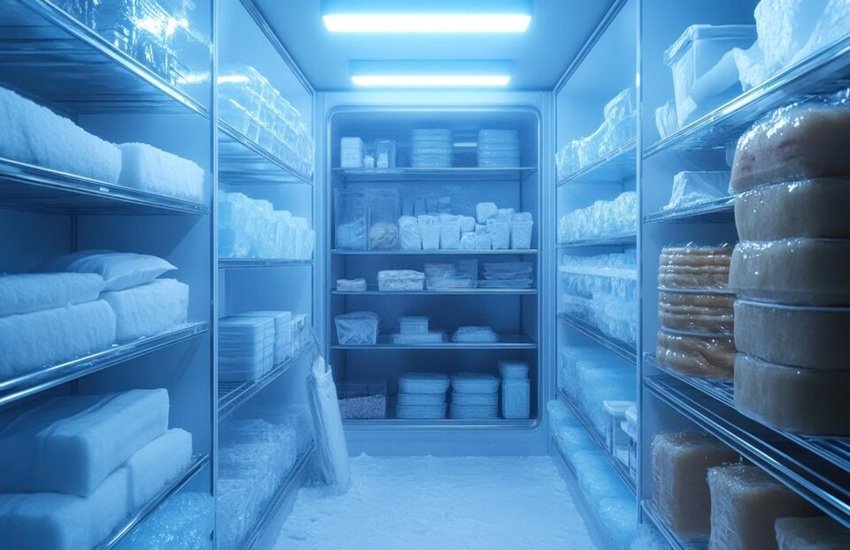Cold storage has become a cornerstone of the pharmaceutical industry, ensuring the quality and safety of many medicines and vaccines that require specific temperature conditions to remain effective. With the growing demand for biologics, vaccines, and temperature-sensitive drugs, maintaining an efficient cold storage system is essential for pharmaceutical companies, healthcare providers, and ultimately, the patients who rely on these critical products.
What is Cold Storage in the Pharmaceutical Industry?
Cold storage refers to the practice of storing products, particularly those that are temperature-sensitive, at specific low temperatures to maintain their effectiveness. In the pharmaceutical industry, cold storage is essential for products such as vaccines, biologics, blood products, and certain medications that lose potency or become unsafe when exposed to higher temperatures.
Cold storage systems are designed to maintain temperatures in a controlled environment, typically between 2°C to 8°C (refrigerated conditions), or ultra-low temperatures ranging from -20°C to -80°C for products requiring deep freeze storage. These storage solutions are equipped with monitoring systems to ensure that the products remain within the required temperature range at all times.
Why is Cold Storage Crucial for Pharmaceuticals?
The pharmaceutical industry is unique in that many of the products it manufactures are highly sensitive to temperature changes. These products include:
- Vaccines: Many vaccines need to be stored at specific temperatures to ensure they remain effective. Even a brief exposure to higher temperatures can destroy the efficacy of a vaccine, potentially compromising public health efforts.
- Biologics: These are complex medications, often made from living organisms, and are particularly vulnerable to temperature fluctuations. Biologics are commonly used to treat chronic diseases, cancers, and other serious health conditions.
- Blood Products: Blood, plasma, and other biological products must be stored at controlled temperatures to prevent contamination and ensure their safety when transfused to patients.
- Injectables and Insulin: Certain injectable drugs and insulin also require refrigeration to remain
stable and effective.
Cold storage ensures that these products are stored and transported under the necessary conditions, maintaining their safety, potency, and compliance with regulatory standards. Here are some key reasons why cold storage is vital in the pharmaceutical industry:
1. Ensures Product Safety and Efficacy
The primary purpose of cold storage in the pharmaceutical industry is to maintain the integrity of temperature-sensitive products. If these products are exposed to temperatures higher than their recommended range, they can degrade, lose potency, or even become hazardous. Cold storage preserves the stability of these products, ensuring they retain their therapeutic properties until they are used by patients.
For example, vaccines need to be stored at precise temperatures to remain effective. If the cold chain is broken, even for a brief period, the vaccine may lose its ability to protect against diseases. This could lead to potential health risks, especially during immunization campaigns.
2. Compliance with Regulatory Requirements
The pharmaceutical industry is heavily regulated, and companies must comply with strict guidelines to ensure their products meet safety and quality standards. Regulatory bodies such as the U.S. Food and Drug Administration (FDA) and the European Medicines Agency (EMA) enforce temperature control requirements for products like vaccines, biologics, and blood products.
Cold storage systems help pharmaceutical companies comply with these regulations by ensuring that the products are stored within the appropriate temperature range. Compliance is not only necessary for public health and safety, but also for avoiding legal consequences and financial losses that could arise from violating these regulations.
3. Reduction in Product Wastage
Without proper cold storage, temperature-sensitive pharmaceutical products could be compromised, leading to significant wastage. Improper storage can result in the need to discard entire batches of drugs, which could be costly for pharmaceutical companies and healthcare providers.
Cold storage minimizes the risk of temperature deviations that can cause products to become ineffective or unsafe, thus reducing the amount of waste generated. This leads to more efficient use of resources and ultimately helps companies save money while improving their bottom line.
4. Improves Shelf Life
Cold storage extends the shelf life of temperature-sensitive pharmaceutical products. By keeping the products within the required temperature range, they remain viable for a longer period. This is especially important for biologics and vaccines that often have limited shelf lives and must be used within specific timeframes.
Prolonging shelf life through proper cold storage practices ensures that products are available for use when needed, especially in emergencies or large-scale public health initiatives. It also helps reduce the financial losses associated with expired products.
5. Prevents Product Contamination
Temperature fluctuations can not only degrade the effectiveness of pharmaceutical products but can also lead to contamination. For instance, vaccines and biologics that are exposed to improper temperatures may undergo chemical changes that make them unsafe for use. Cold storage prevents these issues by maintaining a consistent, controlled environment, reducing the risk of contamination and safeguarding the health of patients who depend on these products.
6. Boosts Operational Efficiency
Cold storage helps streamline the pharmaceutical supply chain by providing reliable storage solutions for temperature-sensitive products. With proper cold storage facilities in place, pharmaceutical companies can maintain a steady supply of products, prevent stockouts, and optimize inventory management.
This leads to greater operational efficiency and ensures that drugs, vaccines, and other critical products are available when needed. A well-managed cold storage system ensures that products are distributed quickly and safely, improving the speed of healthcare delivery and enhancing patient care.
7. Helps with Global Distribution
With globalization, the demand for temperature-sensitive pharmaceutical products is not limited to local markets but extends to global distribution. Cold storage facilities enable the transportation of these products across long distances while ensuring they are stored at the correct temperature. This is particularly important for the global distribution of vaccines, especially during pandemics, when mass distribution is essential for public health.
Cold storage systems, such as refrigerated containers and transport systems, help pharmaceutical companies maintain product quality during international shipments. This ensures that products reach their destinations in the right condition, regardless of the distance.
Challenges in Cold Storage for Pharmaceuticals
While cold storage offers numerous benefits, it does come with its own set of challenges:
- Infrastructure Costs: Setting up cold storage facilities and maintaining them can be expensive. The infrastructure, including refrigeration units, backup power supplies, and monitoring systems, requires significant investment.
- Temperature Monitoring: Cold storage systems require continuous monitoring to ensure that products are stored within the proper temperature range. Any failure in the monitoring system could lead to potential losses.
- Power Failures: A power failure in a cold storage facility can be disastrous, as it could cause temperature deviations that compromise the products. Backup power systems are necessary to prevent this.
Conclusion
Cold storage is an indispensable component of the pharmaceutical industry, ensuring that temperature-sensitive products are stored and transported under optimal conditions. It plays a critical role in maintaining the safety, efficacy, and shelf life of products, complying with regulatory standards, reducing waste, and improving operational efficiency. With the increasing demand for biologics, vaccines, and other temperature-sensitive medicines, the importance of cold storage will only continue to grow.
If your business requires professional cold storage solutions, Ventac offers reliable and high-quality cold storage installation services. Our expert team ensures that your products are stored at the right temperatures to preserve their quality and integrity. With our state-of-the-art systems, you can trust that your pharmaceutical products are in safe hands. Let us help you optimize your cold storage needs and enhance your supply chain efficiency today.




